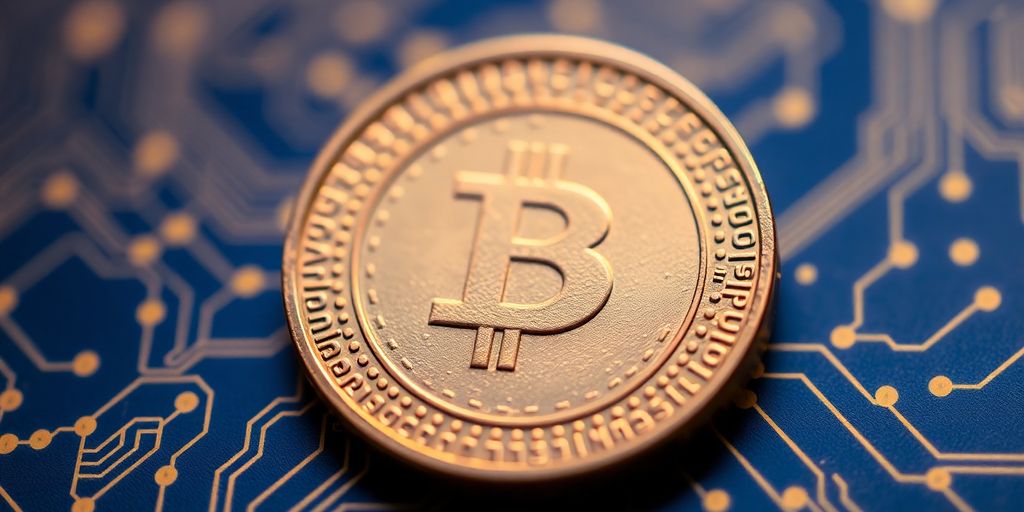India is looking into how to tax digital assets like cryptocurrencies and NFTs. This move is important because it could change how these digital goods are treated in the country. Understanding the current situation and what it means for the future is crucial for everyone involved.
Key Takeaways
- India is exploring a new tax system for digital assets.
- The government is learning from other countries’ experiences with digital asset taxation.
- There are many benefits to taxing digital assets, including more money for the government.
- People have different opinions about how digital assets should be taxed.
- Technology like blockchain could help make tax collection easier.
Understanding the Current Digital Asset Landscape in India
Overview of Digital Assets
In recent years, we have seen a significant rise in the popularity of digital assets in India. These assets, which include cryptocurrencies and tokens, have attracted many investors. Digital assets are often viewed as high-risk investments, leading to discussions about their regulation and taxation.
Key Players in the Indian Market
The Indian digital asset market is bustling with various key players, including:
- Cryptocurrency exchanges like WazirX and CoinDCX.
- Blockchain startups that are innovating in various sectors.
- Investors ranging from individuals to institutional players.
Regulatory Environment
The regulatory landscape for digital assets in India is still evolving. Authorities are considering different approaches, including the possibility of a complete digital asset ban. This uncertainty creates challenges for investors and businesses alike.
| Aspect | Current Status |
|---|---|
| Regulation | Under discussion |
| Taxation | Not yet implemented |
| Market Growth | Rapidly increasing |
As we navigate this landscape, it is crucial to stay informed about the changing regulations and market dynamics.
In summary, the digital asset landscape in India is complex and rapidly changing. We must keep a close eye on developments as they unfold.
India Considers Taxation: A Historical Perspective
Previous Taxation Attempts
In the past, India has made several attempts to regulate and tax digital assets. One of the most significant moves was in the 2022 budget, where the government introduced a new tax framework. This included Section 115BBH, which imposed a 30% tax on profits from trading cryptocurrencies and other virtual digital assets (VDAs) starting from April 1, 2022.
Lessons from Other Countries
We can learn a lot from how other countries handle digital asset taxation. Here are some key takeaways:
- Clarity in Regulations: Countries with clear rules see better compliance.
- Tax Incentives: Some nations offer tax breaks to encourage investment in digital assets.
- Public Awareness: Educating the public about taxes on digital assets can lead to higher acceptance.
Impact on the Indian Economy
The introduction of a taxation framework for digital assets could have several effects on the Indian economy.
- Increased Revenue: Taxing digital assets can provide the government with much-needed funds.
- Market Stability: A clear tax structure may help stabilize the volatile digital asset market.
- Investment Growth: With proper regulations, we might see more investments in the digital space.
As we consider the future of digital asset taxation in India, it is crucial to balance regulation with innovation.
The Role of Cryptocurrency in India’s Financial Ecosystem
Adoption Rates Among Indians
In recent years, we have seen a significant increase in the number of Indians adopting cryptocurrencies. This trend reflects a growing interest in digital finance. Here are some key points regarding adoption rates:
- A survey showed that over 30% of urban Indians have invested in cryptocurrencies.
- Younger generations, especially those aged 18-35, are leading this trend.
- Many people view cryptocurrencies as a way to diversify their investment portfolios.
Cryptocurrency vs Traditional Investments
When comparing cryptocurrencies to traditional investments, we notice some distinct differences:
- Volatility: Cryptocurrencies can experience rapid price changes, unlike more stable traditional assets.
- Accessibility: Digital currencies can be accessed easily through mobile apps, making them more user-friendly.
- Decentralization: Unlike traditional investments, cryptocurrencies operate on decentralized networks, offering more control to users.
Government’s Stance on Cryptocurrency
The Indian government has had a mixed response to cryptocurrencies. While there is recognition of their potential, there are also concerns about regulation and security.
The government is exploring ways to balance innovation with safety in the financial sector.
In summary, as we navigate the evolving landscape of digital assets, it is clear that cryptocurrencies are becoming an integral part of India’s financial ecosystem. They offer both opportunities and challenges that we must address collectively.
| Aspect | Cryptocurrency | Traditional Investments |
|---|---|---|
| Volatility | High | Low |
| Accessibility | High | Moderate |
| Control | Decentralized | Centralized |
Overall, the role of cryptocurrency in India is significant, and it is essential for us to understand its implications for the future of finance.
Challenges in Implementing a Taxation Framework

As we explore the complexities of establishing a taxation framework for digital assets in India, we encounter several significant challenges that need to be addressed. The future of digital asset governance in India hinges on our ability to navigate these obstacles effectively.
Technical Challenges
- Infrastructure Development: We need to build a robust technological infrastructure to track and manage digital transactions.
- Data Security: Protecting sensitive financial data from cyber threats is crucial.
- Integration with Existing Systems: Ensuring that new tax systems work seamlessly with current financial systems is essential.
Legal Hurdles
- Regulatory Clarity: There is a lack of clear regulations regarding digital assets, which complicates taxation efforts.
- Jurisdiction Issues: Determining which laws apply to digital transactions can be tricky, especially with cross-border transactions.
- Compliance Challenges: Ensuring that all stakeholders comply with new tax laws will require significant effort.
Public Perception and Acceptance
- Understanding of Digital Assets: Many people still do not fully understand what digital assets are, which can lead to resistance.
- Trust in Government: Building trust in the government’s ability to manage and tax digital assets is vital.
- Concerns Over Privacy: Individuals may worry about how their financial information will be used and protected.
Addressing these challenges is not just about creating a tax framework; it’s about fostering a healthy environment for innovation while ensuring accountability.
In conclusion, while the path to implementing a taxation framework for digital assets in India is fraught with challenges, it is also an opportunity for growth and development in our financial landscape. We must work together to overcome these hurdles and create a system that benefits everyone involved.
Potential Benefits of Taxing Digital Assets
Revenue Generation for the Government
One of the most significant advantages of implementing a taxation framework for digital assets is the potential for revenue generation. By taxing these assets, the government can:
- Increase its overall tax revenue.
- Fund public services and infrastructure projects.
- Invest in technology and education initiatives.
Encouraging Responsible Investment
Taxation can also promote responsible investment behaviors among individuals and institutions. When digital assets are taxed, it encourages:
- More informed investment decisions.
- A focus on long-term gains rather than short-term speculation.
- Greater transparency in transactions, leading to a healthier market.
Enhancing Market Stability
Finally, a well-structured taxation framework can contribute to market stability. By regulating digital assets through taxation, we can:
- Reduce volatility in the market.
- Create a safer environment for investors.
- Foster trust in the digital asset ecosystem.
In summary, a taxation framework for digital assets can lead to significant benefits, including increased revenue, responsible investment, and enhanced market stability. Tax rules for the digital economy can help promote growth and deliver on the green and digital transitions.
Stakeholder Perspectives on Digital Asset Taxation
Views from the Financial Sector
In our discussions with various financial institutions, we have noticed a growing interest in how digital assets are taxed. Many believe that a clear taxation framework will enhance market confidence. Here are some key points that emerged:
- Transparency in taxation is crucial for attracting institutional investors.
- Financial institutions are eager for guidelines that align with global standards.
- There is a call for collaboration between the government and financial entities to create effective policies.
Opinions of Digital Asset Investors
Digital asset investors have diverse views on taxation. From our interactions, we found that:
- Many investors are concerned about the potential tax burden on their profits.
- Some believe that taxation could legitimize the market and encourage more participation.
- Others worry about the complexity of compliance and the potential for double taxation.
Government and Regulatory Insights
Government officials have shared their perspectives on the need for a taxation framework. They emphasize:
- The importance of regulating the digital asset space to prevent fraud.
- A balanced approach that fosters innovation while ensuring revenue generation.
- The need for ongoing dialogue with stakeholders to refine the taxation model.
In our view, creating a taxation framework for digital assets is not just about collecting revenue; it’s about building a sustainable ecosystem that benefits everyone involved.
Overall, the perspectives from various stakeholders highlight the complexity and necessity of establishing a taxation framework that is fair, transparent, and conducive to growth in the digital asset market.
Comparative Analysis with Global Taxation Models

Case Study: United States
In the United States, the taxation of digital assets is quite complex. The Internal Revenue Service (IRS) treats cryptocurrencies as property, which means that any gains from their sale are subject to capital gains tax. This approach has led to significant compliance challenges for investors. Here are some key points about the U.S. model:
- Digital assets are taxed as property.
- Taxpayers must report gains and losses on their tax returns.
- The IRS has issued guidelines to clarify tax obligations.
Case Study: European Union
The European Union (EU) has taken a more unified approach to digital asset taxation. Each member state has its own rules, but there are common principles that guide taxation across the region. The EU aims for consistency in how digital assets are treated. Key aspects include:
- VAT (Value Added Tax) exemptions for certain digital assets.
- Capital gains tax applied uniformly across member states.
- Ongoing discussions about a comprehensive framework.
Lessons for India
As we look at these global models, there are valuable lessons for India. We can learn from the challenges and successes of other countries. Here are some takeaways:
- Clarity in regulations is crucial for compliance.
- A unified approach can help avoid confusion among investors.
- Continuous dialogue with stakeholders can lead to better frameworks.
Understanding how other countries handle digital asset taxation can guide us in creating a robust framework that meets our unique needs.
By analyzing these global taxation models, we can better prepare for the future of digital asset taxation in India. We must consider both the benefits and challenges that come with implementing such a framework.
Technological Innovations and Their Impact on Taxation

Blockchain Technology
Blockchain technology is a game changer for how we think about taxation. It allows for transparent and secure transactions, which can help tax authorities track digital assets more effectively. This transparency can reduce tax evasion and ensure that everyone pays their fair share.
Smart Contracts
Smart contracts are another innovation that can simplify the taxation process. These are self-executing contracts with the terms of the agreement directly written into code. They can automate tax calculations and payments, making the process faster and less prone to errors.
Future Trends in Digital Asset Management
As we look ahead, we see several trends that could shape the future of digital asset taxation:
- Increased use of artificial intelligence to analyze transaction data.
- Development of more user-friendly tax reporting tools for individuals and businesses.
- Greater collaboration between governments and tech companies to create effective tax frameworks.
The evolution of cryptoassets has been an exasperating experience for tax administrations the world over and it is no different in India.
In conclusion, technological innovations like blockchain and smart contracts are not just buzzwords; they are tools that can help us create a more efficient and fair taxation system for digital assets. By embracing these technologies, we can pave the way for a more organized and transparent financial ecosystem.
Future Outlook: India Considers Taxation and Beyond

Predictions for the Indian Market
As we look ahead, we can expect that crypto adoption continues to rise in India. This growth will likely lead to more discussions about how to effectively tax digital assets. Here are some predictions we can consider:
- Increased clarity in regulations will help investors feel more secure.
- More businesses may start accepting cryptocurrencies as payment.
- The government might introduce new tax policies to keep up with the changing market.
Long-term Economic Implications
The long-term effects of taxing digital assets could be significant. We believe that:
- Taxation could lead to increased government revenue.
- It may encourage more responsible investment practices among individuals.
- A clear taxation framework could stabilize the market, making it less volatile.
Potential Policy Developments
We anticipate that the government will explore various policy options. Some potential developments include:
- Creating a dedicated task force to study digital assets.
- Engaging with international experts to learn from their experiences.
- Implementing pilot programs to test new taxation methods.
In conclusion, as we navigate the future of digital asset taxation in India, it is crucial to balance innovation with regulation. This will help ensure a healthy financial ecosystem for all stakeholders involved.
Conclusion
In summary, as India explores a taxation system for digital assets, it is clear that this is a significant step towards regulating a rapidly growing sector. The government’s efforts to create a clear framework will not only help in collecting taxes but also provide a safer environment for investors. By understanding the challenges and opportunities that come with digital assets, India can set a strong example for other countries. As we move forward, it will be important for all stakeholders, including the government, businesses, and users, to work together to ensure that this new system is fair and effective.
Frequently Asked Questions
What are digital assets?
Digital assets are things you can own or trade online, like cryptocurrencies, digital art, or virtual items in games.
Why is India considering a tax on digital assets?
India wants to tax digital assets to make money for the government and to regulate the growing market.
How would a tax on digital assets work?
If a tax is introduced, it would mean that when you sell or trade digital assets, you might have to pay a percentage of the profit to the government.
What are the challenges of taxing digital assets?
Some challenges include figuring out how to track these assets, changing laws, and getting people to accept the new taxes.
What benefits could come from taxing digital assets?
Taxing digital assets could help the government earn money, encourage safe investments, and make the market more stable.
How do other countries tax digital assets?
Countries like the U.S. and those in the European Union have their own rules and taxes for digital assets, which India can learn from.
What is the government’s current view on cryptocurrency?
The government is still deciding how to handle cryptocurrency, balancing between regulation and support for innovation.
What does the future hold for digital asset taxation in India?
In the future, we might see new laws and policies that shape how digital assets are taxed, which could impact the economy.





